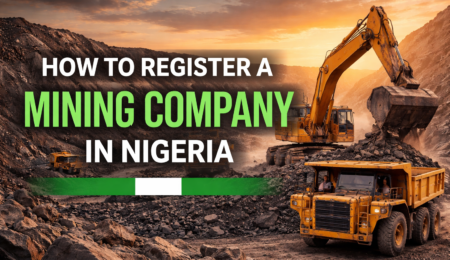Operating in the vibrant world of Nigerian mining and mineral trade industry can be exciting, but navigating the permit process can feel like deciphering a cryptic map. Fear not! This comprehensive guide will equip you with the knowledge to navigate the different types of mineral permits in Nigeria, opening the door to unlocking the country’s vast mineral wealth.
Charting Your Course: Understanding Mineral Permits in Nigeria
The Nigerian solid mineral sector is brimming with potential, but understanding the right permits is crucial for success. Here’s a breakdown of the key types of permits and mineral licenses:
1. Reconnaissance Permit (RP): Your First Footsteps
Think of this permit as your exploration visa. It grants non-exclusive access to fly over or enter land for surface sample collection, allowing you to assess the potential of an area. Remember, subsurface activities like drilling and excavating are off-limits with an RP, but it’s a valuable first step for mapping your mineral treasure hunt.
2. Exploration License (EL): Digging Deeper
This license grants you exclusive rights to explore a specific area (up to 200km²) for three years, with the possibility of two two-year renewals. Now, you can go beyond surface samples and delve deeper with drilling and other exploration activities to truly understand the mineral potential.
3. Small Scale Mining Lease (SSML): Unearthing Treasures on a Smaller Scale
Found a promising pocket of minerals? This license allows you to extract them on a smaller scale (up to 3km²) for five years, with the option of a five-year renewal. Perfect for beginners, artisanal miners or small scale ventures.
4. Mining Lease (ML): Large-Scale Operations for Big Discoveries
Struck tourmaline, gold, tantalum, or beryllium? This is the permit for you! It grants exclusive rights for large-scale mining operations on an area up to 50km² for 25 years, with 24-year renewals possible. Time to build your mining empire!
5. Quarry Lease (QL): Unearthing Building Blocks
Not all minerals sparkle. This permit caters to the extraction of essential construction materials like granite, sand, and limestone. It’s valid for five years on an area up to 5km², with five-year renewals available.
6. Water Use Permit (and Operations WUP): Essential for Life
Water is the lifeblood of any mining operation. This permit grants exclusive rights to obtain and convey water, ensuring your mining activities run smoothly. It’s linked to the validity of your exploration or mining license.
📘 The Nigeria Mineral Trading & Licensing Blueprint (2026 Edition)
If you are serious about buying, selling, or trading minerals legally in Nigeria, you cannot afford to rely on guesswork, outdated advice, or hearsay. The regulatory environment is tightening fast, and costly mistakes now lead to permit denials, seizures, or permanent blacklisting.
That’s why we created The Nigeria Mineral Trading & Licensing Blueprint: 2026 Guide to Buying Center Licenses & Purchase Permits — an updated, clear, step-by-step, insider guide that shows you exactly how to obtain Mineral Buying Center Certificates, Purchase & Possession Permits, and related approvals without delays or regulatory traps.
This guide distills real regulatory procedures for 2026, compliance requirements, and practical insights used by serious operators — saving you months of confusion, wasted money, and avoidable risk.
If mineral trading is part of your business future, this blueprint is not optional — it’s protection.
Navigating the Nigerian Mineral Marketplace: Essential Permits for Buying, Selling, and Exporting Minerals
Beyond exploration and extraction, Nigeria’s mineral sector also offers exciting opportunities for trade and commerce. To ensure ethical and regulated mineral transactions, here are key permits to keep in mind so as to operate within the dictates of Nigerian mineral trade regulations:
- Certificate of Mineral Buying Center (CMBC):
Mineral buying center permit unlocks the door to mineral trading in Nigeria. It grants holders the right to establish a shop for buying and selling minerals within Nigeria, covering four categories: Metallic, Non-metallic, Precious Metals, and Precious Stones/Gemstones. With annual renewals, it’s essential for establishing a thriving mineral business.
2. Permit to Purchase and Possess Minerals (PPPM):
Whether you’re an individual collector or a large-scale buyer, this license is your legal passport to acquiring and possessing minerals in Nigeria. It’s required by law and renewable annually, ensuring responsible and traceable mineral ownership.
3. Permit to Export Mineral Samples (PEMS):
Scientific research or analysis often requires a closer look at mineral samples beyond Nigeria’s borders. This permit grants the right to export mineral samples for testing, analysis, or scientific experiments, facilitating knowledge exchange and innovation in the mineral sector.
4. Permit to Export Minerals for Commercial Purposes (PEMCP):
Ready to take your mineral products to the global stage? This permit unlocks the pathway for exporting minerals from Nigeria for commercial purposes, subject to payment of prescribed royalty fees. It’s a vital step for mineral businesses seeking to expand their reach and contribute to the nation’s economic growth.
5. Export Permit (EP):
While not specific to minerals, this license is a cornerstone for any exporting venture in Nigeria. Issued by the Nigerian Export Promotion Council (NEPC) and renewable every two years, it streamlines the export process and ensures compliance with national trade regulations.
Ready to Chart Your Course?
Now that you’re armed with knowledge, it’s time to explore the possibilities! Contact us today for personalized guidance on navigating the Nigerian mineral permit process and turning your mineral dreams into reality.
Call/ Whatsapp: +2348130799304

READ Also:
Need a Mining License or Mineral Trade Permit in Nigeria? Here’s How We Can Help





Leave a Reply